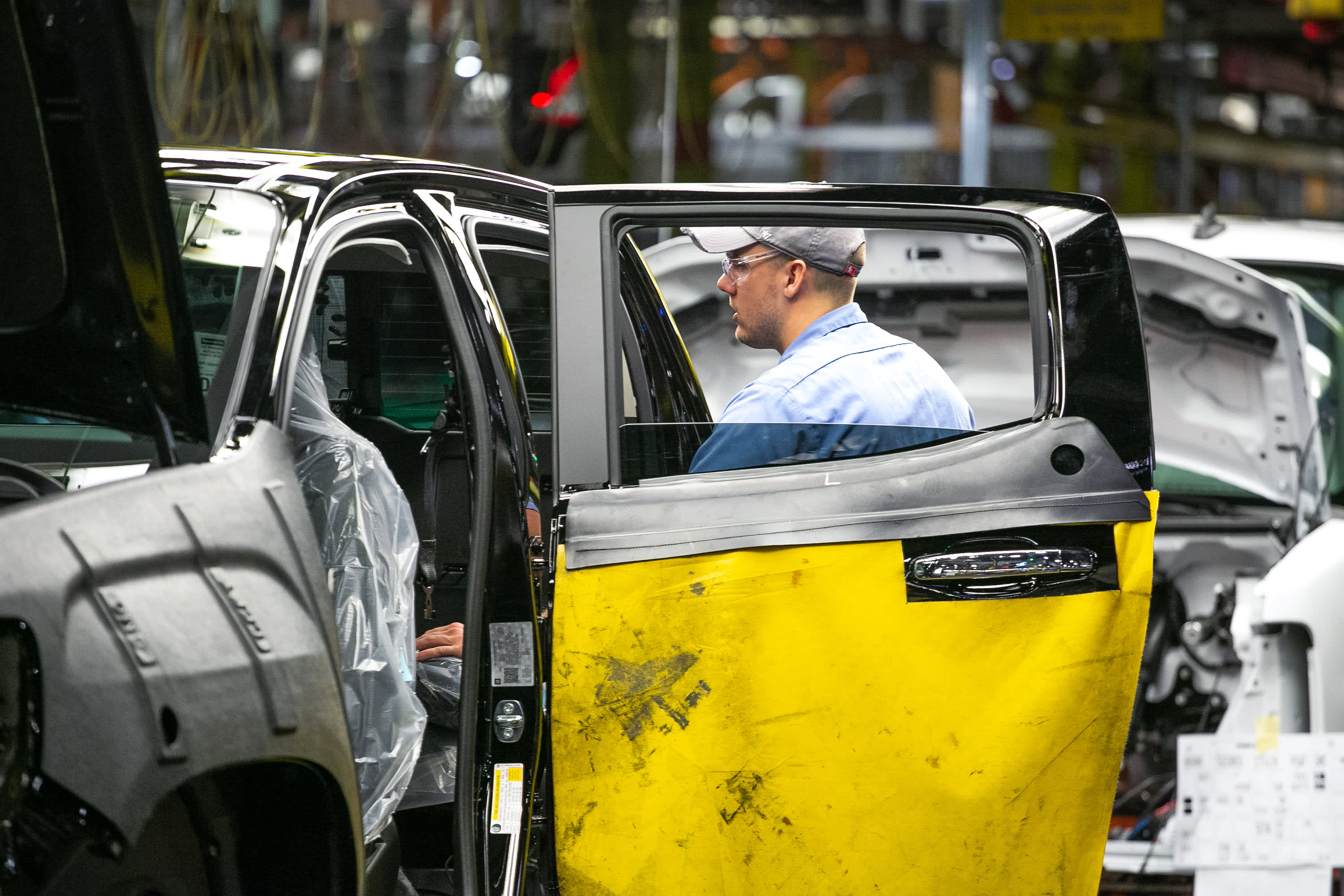A General Motors employee works Dec. 13, 2019 at the automaker’s plant in Wentzville, Missouri.
Photo by Melissa Vaeth for General Motors
General Motors is using salaried employees to fill in for hourly union workers absent due to coronavirus to keep a Missouri truck plant operating.
High rates of absenteeism at the company’s Wentzville Assembly plant in Missouri have forced the company to juggle around workers over the last three weeks, according to GM spokesman Jim Cain. The salaried workers, he said, are a short-term fix until the company can transfer workers from other plants and hire about 200 temporary employees to fill the positions.
“It’s been a challenge to achieve the kind of stability you’d like to see,” he said. “To bridge us through until we can get to our long-term solution, we have asked for volunteers from the salaried team, primarily within manufacturing, to spend at least a week working the line.”
Dozens of employees have volunteered, according to Cain. The employees are trained in the position as well as safety, quality and other protocols, he said.
GM is attempting to replenish dealer inventories that were depleted after the coronavirus pandemic led to a shutdown for about two months in the spring.
Union grievances
The use of salaried employees has drawn the ire of the local United Auto Workers chapter, which has filed grievances about the practice. The UAW argues the automaker is violating its contract with the union.
“We have strenuously objected to this violation of the contract,” UAW spokesman Brian Rothenberg said. “It is clearly a violation of the contract. I would hope this gets resolved soon.”
Under the UAW’s contract with the automaker, non-union salaried employees are not to “be permitted to perform work on any hourly-rated job except in the following types of situations: (1) in emergencies arising out of unforeseen circumstances which call for immediate action to avoid interruption of operations; (2) in the instruction or training of employees, including demonstrating the proper method to accomplish the task assigned.”
It could be argued the coronavirus pandemic causing broad absenteeism across the automotive industry could be considered “unforeseen circumstances,” however, the union disagrees.
Kristin Dziczek, vice president of industry, labor and economics at the Center for Automotive Research, said the use of the salaried workers on assembly lines is “highly unusual, but these are highly unusual times.”
Uncommon practice
Such a practice is uncommon — particularly for a unionized workforce — but not unprecedented.
Honda Motor last month confirmed to CNBC that it also was using salaried employees to fill positions in its manufacturing operations.
“Due to strong customer demand for our products and the need to carefully manage production during the COVID-19 pandemic, we are facing some temporary staffing issues that require support from associates who do not typically work in production,” the Japanese automaker said in an emailed statement in late July. “We have implemented such temporary measures in the past, and are working diligently to attract and hire associates to support our production needs.”
It’s unclear whether Honda is still using salaried workers on its factory floor. A Honda spokesman did not immediately respond to a request for comment.
GM’s plant in Missouri has been more problematic than most when it comes to absenteeism. The automaker announced plans this summer to cut one of three shifts from the plant starting last month. It later withdrew those plans through alternative staffing solutions, which didn’t pan out as initially planned.
GM produces popular Chevrolet and GMC midsize pickups and vans at the plant in Missouri. The state has reported about 76,000 confirmed coronavirus cases, including nearly 1,500 deaths. St. Charles County, where the plant is located, is fourth in the state for the number of confirmed cases, according to public data.
The Detroit automaker has said it believes workers at its plants shouldn’t be concerned about coming to work because the company has implemented new procedures to keep everyone as safe as possible.
GM has urged its employees to follow the same protocols whether at work or at home, including social distancing and wearing masks when they’re in groups. The Detroit automaker as well as its crosstown rivals have implemented temperature checks and Covid-19 testing procedures, among other safety measures.
